Home > Frontline Heroes Articles
FRONTLINE HEROES ARTICLES
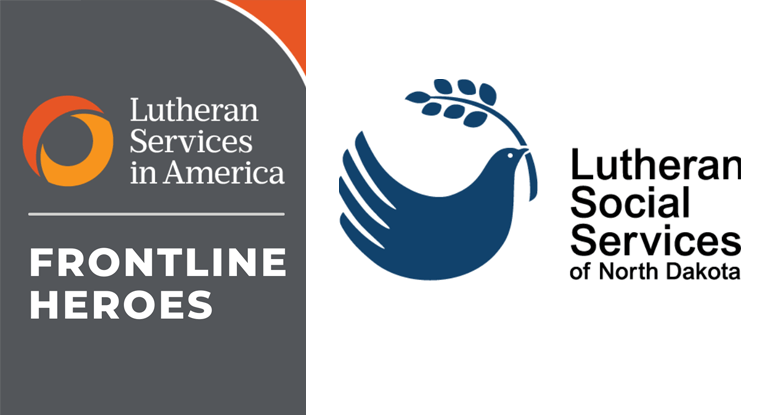
Today’s Front Line Hero: Lutheran Social Services of North Dakota
By: Caitlyn Gudmundsen
April 27, 2020
Today’s Front Line Hero is Lutheran Social Services of North Dakota and its Aging Life Care Program (ALC), which is adjusting its services to provide remote service delivery whenever possible during the COVID-19 pandemic. Aging Life Care connects older adults and individuals with chronic medical or mental health needs with..
Read More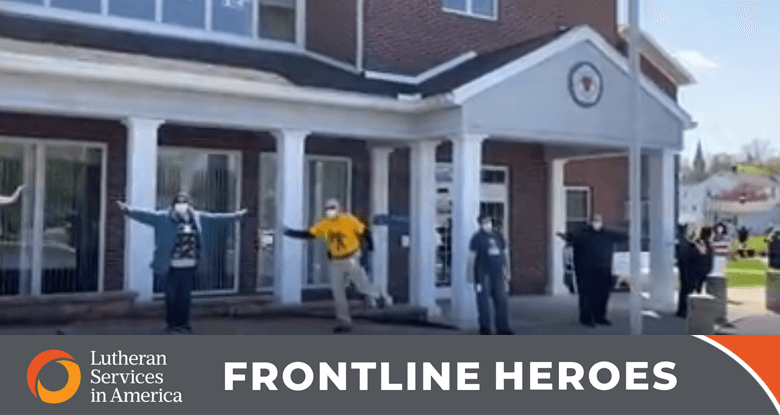
Today’s Front Line Hero: Allegheny Lutheran Social Ministries
Today’s Front Line Hero is Allegheny Lutheran Social Ministries, which is working hard to provide..
April 28, 2020
Read More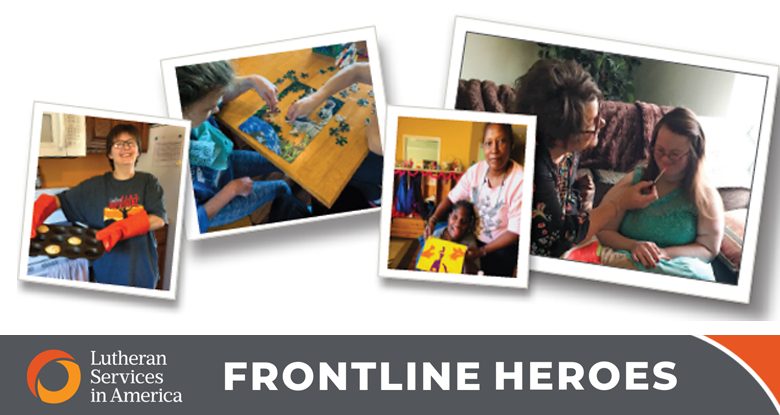
Today’s Front Line Hero: Lutheran Family Services of Virginia
Today’s Front Line Hero is Lutheran Family Services of Virginia, and all the Direct Support..
April 29, 2020
Read More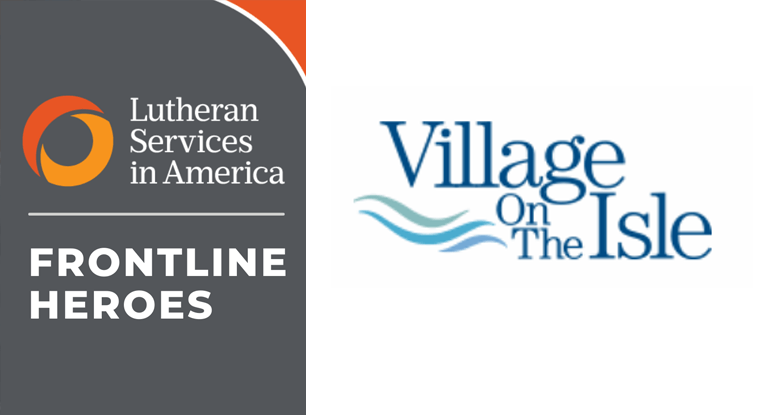
Today’s Front Line Hero: Village On The Isle
Today’s Front Line Hero is Village On The Isle for their commitment to keeping residents..
April 30, 2020
Read More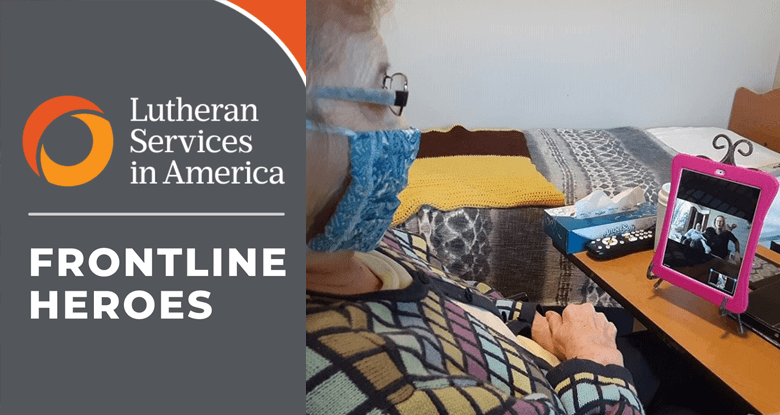
Today’s Front Line Hero: Ecumen
Today’s Front Line Hero is Ecumen, which quickly designed an innovative program called “Stay Connected”..
May 1, 2020
Read More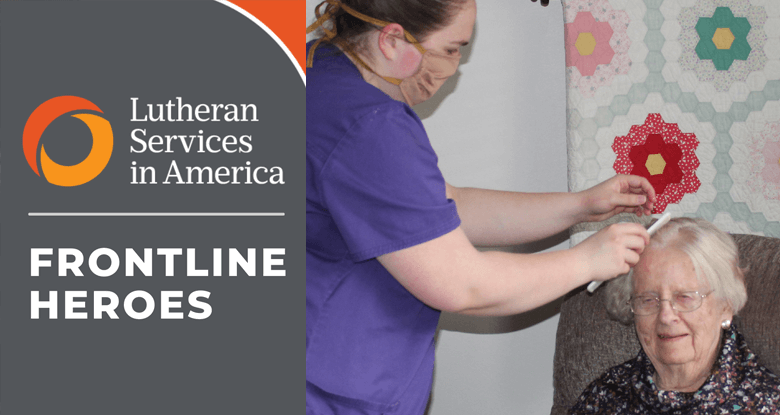
Today’s Front Line Hero: Samaritas
Today’s Front Line Hero is Samaritas and its committed staff who are working hard to..
May 4, 2020
Read MoreSEARCH BLOG
RECENTLY ADDED
Knowledge is a Key to Freedom
Sheyla Rodriguez will enter Yale University this fall. She has a bright future, but it took a long journey for her to arrive at this point.
She and her family left Cuba when she was eleven and within days stood at the border between Mexico and the United States. They left a repressive dictatorship to live in a nation where freedom and opportunity are available to all people. She is now a permanent U.S. resident and is graduating from Chula Vista High School in California with a 4.6 grade point average.
Always studious, Sheyla made excellent grades, but felt cut off from the world during the COVID lockdown. Despite living with loving and supportive parents, she could not spend time with classmates in person or have extended conversations with teachers. Gradually she slipped into depression, her classes felt like a burden, her self-image suffered and she lost her passion for the future.
Then she learned about Upward Bound. This program, offered through the U.S. Department of Education and administrated by Lutheran Social Services of Southern California, helps students develop the skills and motivation to complete high school and succeed in postsecondary studies. At least two-thirds of the participants are first generation college students from low-income families.
Sheyla said Upward Bound helped her in three ways:
- The instructors in the required college-level courses she took during summers inspired her with their passion for learning;
- Her new friends in the program felt like an extended family; and
- Upward Bound strengthened her with a hope for her future.
Her parents work in a local hotel, her dad as a house man and her mom as a housekeeper. They have loved and supported their daughter in every conceivable way. Her father’s mantra has always been, “Knowledge is a key to freedom.” Graduation day at Chula Vista High School will be a celebration for the entire Rodriguez family. Sheyla is the valedictorian of her class!
Lutheran Social Services of Southern California is a member of Lutheran Services in America, a national network of 300 Lutheran health and human services organizations that reaches one in 50 people in America each year.
Learn more about Lutheran Social Services of Southern California.
Carroll Lutheran Village Restarts Ministry Program Offering Help, Hope and Healing
Two years ago, the pandemic put the Stephen Ministry program at the Lutheran Social Ministries of Maryland community Carroll Lutheran Village (CLV) in Westminster, Maryland, on hold for safety reasons. Now, a team of four residents and an associate chaplain has returned to manage the program and resume its work with CLV residents on depression, loneliness, family loss, loss of faith, health, end-of-life and other challenging issues and are grateful to be providing caregiving again.
Stephen Ministry trains lay people to provide one-to-one Christian care to those experiencing grief, illness, hospitalization, life transitions, or another life challenge. Bob Nicoll, the program’s class administrator, provides oversight with two other CLV Stephen leaders: Connie Kidder and Jay King. CLV’s associate chaplain Charles Marshall and Spiritual Life Committee chair James Boesler round out the leadership team. Each team member received 50 hours of specialized training to be a Stephen minister before working with residents.
While the reasons for volunteering vary for each, they all share an understanding of the program’s importance and necessity. Kidder became interested in caring ministries early in life. As a young adult, she received support from her church, family and others. Since then, she has had a passion for helping others.
King’s interest in assisting older adults came from his interactions with a pastor while in high school. He stated, “Now I am one,” yet he still enjoys befriending residents who are close in age. He saw an ad about Stephen Ministries at CLV and immediately applied. He feels lucky to have been in the right place at the right time. Stephen Ministries allows him to do what he loves—empowering others.
Boesler faced many challenges and at one time thought, “God can’t love me.” It took time, but he now believes, despite everything, God loves him. He wants others going through a difficult time to know God is with them all the time. This desire led Boesler to complete the Stephen Ministry training so he can support CLV residents.
After a long career in management where Nicoll spent most of his time with lots of people and organizations, he said, “I wanted to find something different—something to experience one-on-one relationships.” As a Stephen minister, he’s been able to experience those relationships.
Nicholl said, “We routinely remind our team that we are caregivers, not cure givers—the latter is in God’s hands.” CLV’s eight Stephen Ministers are careful to remember they are not therapists and avoid trying to fix care receivers’ problems. If care receivers need more support than a minister can offer, a referral is made to an outside professional or mental health specialist.
The leadership team plans to expand the program to include reaching those who may need support but do not require the full program. For example, some residents may benefit from simply having a conversation with a Minister rather than meeting for multiple sessions.
Considering the challenges many are facing since the pandemic started, CLV’s residents and team members are happy to have Stephen Ministers and Leaders in the community to provide caring support.
Lutheran Social Ministries of Maryland is a member of Lutheran Services in America, a national network of 300 Lutheran health and human services organizations that reaches one in 50 people in America each year. Carroll Lutheran Village, a community of Lutheran Social Ministries of Maryland, is an accredited, not-for-profit continuing care retirement community that supports nearly 700 residents in 397 homes and apartments, 50 assisted living suites and 103 skilled care beds.
Learn more about Lutheran Social Ministries of Maryland.
LSS of Southern California Offers a Basket of Hope on Easter
Elizabeth Gomez first came to Lutheran Social Services of Southern California’s Orange County center three years ago after her husband lost his job. As their primary source of income disappeared, Elizabeth and her family became desperate for groceries and other essentials.
LSS stepped in to support Elizabeth and her family in their time of need. The organization provided essential services, including rental assistance and support with transportation. LSS helped the family get connected to other community resources as well. The organization continued to support the family during this difficult and frightening time as they slowly got back on their feet.
This past Easter, Elizabeth’s three children received Easter baskets donated by the Mt. Calvary Lutheran Church in Cypress and Good Shepherd Lutheran Church in Irvine. Even in times of poverty and struggle, the children received much-needed comfort—and the opportunity to just be kids.
Today, with assistance from LSS’s dedicated team, Elizabeth was able to apply for benefits as her husband secured new employment. They are all looking forward to moving onto the next chapter of their lives, together.
Lutheran Social Services of Southern California is a member of Lutheran Services in America, a national network of 300 Lutheran health and human services organizations that reaches one in 50 people in America each year.
Learn more about Lutheran Social Services of Southern California.
Ukrainian Sanford Health Nurse Reunites with her Family
Weeks of fighting in Ukraine have been felt inside and outside the European nation, including 5,000 miles away in rural Bemidji, Minnesota. Olha Finnelly is a nurse at a local Sanford Health clinic whose family lives in Dnipro, about 250 miles southeast of capital Kyiv. The longer the war continued, the more her colleagues worried about her and her family.
“We’d ask, ‘how’s your family?’ One day all of the sudden she wasn’t functioning so well. Very teary-eyed. She was trying to get them out (of Ukraine). When we all heard that, we had to help,” said Kim Schulz, a medical laboratory scientist at Sanford Bemidji.
While Finnelly’s father and brother stayed in Ukraine to support their country, her mother, sister and three-year old niece traveled 22 hours by train, sharing a room that was designed for four with 16 people.
“They didn’t have any luggage with them,” Finnelly said. “The only belongings that they had were backpacks. They brought underpants for the little one. Some snacks, because you are not sure if you are able to get some food.”
Finnelly’s family would take a small bus to the Polish border, eventually making it to Krakow. From there, Finnelly booked them plane tickets to Minneapolis. The total expense for their travel was $3,000, all paid for by Finnelly’s co-workers who raised the money.
“In our Ukrainian language, we have this saying. ‘Tell me who is your friend, and I can tell you who you are.’ So I’m just so happy with my colleagues. (The) Sanford family in Bemidji … we are really like real family over here,” said Finnelly.
Sanford Health is the parent organization of the Evangelical Lutheran Good Samaritan Society, which is a member of Lutheran Services in America, a national network of 300 Lutheran health and human services organizations that lifts up one in 50 people in America each year. This year, The Evangelical Lutheran Good Samaritan Society celebrates 100 years of lifting residents, loved ones, and members of its community.
Learn more about Sanford Health and the Evangelical Lutheran Good Samaritan Society.
This is an abridged version of a story that was originally featured in Sanford Health News.
Lutheran Services in America Urges CMS to Reconsider Skilled Nursing Facility Initiative
Lutheran Services in America Urges CMS to Reconsider Skilled Nursing Facility Initiative, Seeks Member Data
In response to the recently announced plan by the Centers for Medicare & Medicaid Services to establish a minimum staffing requirement that would increase staffing in skilled nursing facilities (without additional funding), along with expanded inspections and increased penalties and enforcement, Lutheran Services in America wrote a letter to CMS administrator Chiquita Brooks-LaSure outlining our concern about the lack of understanding of the workforce shortages facing skilled nursing providers and the result that older adults will not have access to the care they need. We also invited our members and their networks to participate in our advocacy campaign to Brooks-LaSure and members of Congress.
Now, as we prepare for meetings with the Biden administration and lawmakers, we are strengthening our message with more facts and data from the Lutheran Services in America network and invite our SNF members to complete our quick survey.
CMS Updates COVID-Related Rules on Vaccinations, CNA Training
On April 5, CMS issued revisions to its rule mandating COVID-19 vaccination for workers at skilled nursing facilities, stating that staff who have been suspended or are on extended leave won’t count against the providers as “unvaccinated staff.” The agency also clarified that providers who have made “good-faith efforts” to ensure all staff are vaccinated but have not achieved full compliance may receive relief in the form of less severe citations and penalties. The guidance included several examples.
Subsequently, on April 7, CMS also announced that it is restoring training requirements for nurse aides who work at skilled nursing facilities after temporarily waiving them due to COVID-19. Since March 2020, the waiver for nurse aide certifications had allowed SNFs and other nursing facilities to employ aides for longer than four months without the necessary training and certification. While some waivers will still be allowed in cases where training and testing programs are over capacity, the majority will now terminate on June 7.
Eventual End of COVID-19 Public Health Emergency Will Impact Providers, States
The U.S. Department of Health and Human Services declared COVID-19 to be a “public health emergency” (PHE) effective January 27, 2020. This declaration activated certain emergency authority measures and the Department has also subsequently issued several rules and regulations linked to the existence of a PHE. Relief legislation passed by Congress has also tied various provisions offering flexibility on Medicare and Medicaid rules to the PHE. A PHE declaration automatically expires after 90 days, but HHS has issued repeated renewals of the COVID-19 PHE, with the current declaration now running through July 15, 2022.
While the Biden administration has committed to providing states with 60 days’ notice prior to allowing the PHE to terminate, it is expected that the PHE will end at some point this calendar year. States and healthcare providers are encouraged to prepare themselves and those they serve for the consequences of the end of the PHE, so we have compiled a chart outlining the key flexibilities which are currently in effect that will come to an end when the PHE does or shortly thereafter.
Upcoming Congressional Town Hall Meetings
Members of Congress continue to hold virtual town hall meetings to address constituent concerns about coronavirus relief. Here is a look at upcoming sessions (click links below to find out how to join):
| Member | District | Party | Format | Date & Time | Link | |
| Sen. Ron Wyden | OR | D | Virtual (Gilliam County) | Apr. 19, 11 am PT | More | |
| Sen. Ron Wyden | OR | D | Virtual (Umatilla County) | Apr. 19, 4 pm PT | More | |
| Rep. Chrissy Houlahan | PA-6 | D | In person (Phoenixville) | Apr. 19, 6:30 pm ET | More | |
| Rep. Lauren Underwood | IL-14 | D | In person (Huntley) | Apr. 19, 5:30 pm CT | More | |
| Rep. Byron Donalds | FL-19 | R | In person (Sanibel) | Apr. 19, 6 pm ET | More | |
| Rep. Elaine Luria | VA-2 | D | In person (Virginia Beach) | Apr. 19, 6:30 pm ET | More | |
| Sen. Ron Wyden | OR | D | Virtual (Union County) | Apr. 20, 10 am PT | More | |
| Sen. Ron Wyden | OR | D | Virtual (Wallowa County) | Apr. 20, 2:30 pm PT | More | |
| Rep. Derek Kilmer | WA-6 | D | Telephone | Apr. 20 | More | |
| Rep. Ayanna Pressley | MA-7 | D | Virtual | Apr. 20, 7 pm ET | More | |
| Rep. Lauren Underwood | IL-14 | D | In person (Naperville) | Apr. 20, 5:30 pm CT | More | |
| Rep. Kim Schrier | WA-8 | D | In person (Wenatchee) | Apr. 20, 5 pm PT | More | |
| Rep. Tom Cole | OK-4 | R | Telephone | Apr. 20, 6 pm CT | More | |
| Sen. Ron Wyden | OR | D | Virtual (Morrow County) | Apr. 21, 1 pm PT | More | |
| Rep. Cathy McMorris Rodgers | WA-5 | R | Telephone | April 27, 6 pm PT | More | |
Adam Libby: A Bold Chef Who’s Become a Social Media Phenomenon
Since Adam Libby was a little boy, he’s been an entertainer. Back then, he put on plays in his yard—confidently assimilating all the characters—and people in his small town of Lincoln, Maine, would come to see him.
“He’s a comedian and a storyteller. He doesn’t shy away from the limelight at all,” laughs Teresa Hess, a community living coordinator at the Mosaic service Living Innovations. “Sometimes when he’s talking with you, he imitates a character in a movie he’s recently watched, and he does a really good job.”
In fact, according to his twin sister, Emily McCormick-Libby, “Adam has always loved entertaining, and he’s always dreamt of becoming an actor.”
Emily added he loves to cook, too, and has done so almost his entire life.
Adam, 30, was born with Down syndrome. Mosaic is passionate about helping people like Adam lead meaningful, healthy lives on their own terms. With more than 100 years of experience of providing care, the Nebraska-based organization supports people and communities in more than a dozen states, from Arizona to Adam’s home state of Maine.
To combine all of Adam’s attributes, his Living Innovations support team came up with the idea of his recording and posting “how-to” cooking videos on the social media platform TikTok. “I thought this would be a great way for him to reach people, show off his personality and focus on his conversation skills,” added Emily. “My wife, who’s a professional videographer, and I started with his first post on how to cook burritos.” That was April 16, 2021.
With his older sister, Brianne, assisting as well, they continued by trying to post at least one video each week. Adam gradually gained 1,000 followers and celebrated the milestone with a video of him making cupcakes. That was July 30.
But it was a short time after, on August 6, when Adam demonstrated making pizza in a woodfired pizza oven, he went viral. We’re talking worldwide viral. That video garnered almost 12.4 million views and shot up the number of his followers to 612,000 with 3.4 million likes on his videos.
In another segment, where he’s exuberantly shouting out what has become his popular catchphrase, “holy crow, man!”, he made homemade french fries that could best any short order cook’s. That video has captured 924,000 views to date.
A few weeks ago, Adam’s TikTok account hit 1.5 million followers.
“He just loves what he’s doing; he’s just eating it up,” stated Emily. “It’s unbelievable. I can’t get my head around how many people are following him and engaging with him!”
With his jubilant and upliftingpersonality, Adam’s such an inspiration that he’s making videos with some of his biggest fans. In one, he’s encouraging a young boy, also with intellectual disabilities, to cook a meal for his family (albeit a meal made of a quick-service restaurant’s chicken nuggets and fries): “Good job, dude! You’re making your mom proud of you!”
Additionally, he’s captured the heart of professional chefs. Tommy Isidori, an executive chef at a Fairfield, Connecticut, country club, sent a chef’s coat with “Chef Adam Libby” embroidered on the front. Isidori also included a professional chef’s knife.
“Chef Tommy is my favorite chef,” said Adam, and he has a few others. At the mention of Chef Gordon Ramsay, his face instantly lit up. “Yeah, I like him too!”
“He hopes Chef Ramsay will see his videos so he can meet him one day,” added Emily. “Chef Ramsay is tagged in many of his posts and comments from his followers.”
Besides the news coverage in his hometown newspaper and on the local CBS affiliate, Adam is being covered by many other social media channels and media outlets overseas. “No one contacted us,” remarked Emily. “We just saw the other stories, including some in England, when we Googled ‘Chef Adam Libby.’
“The thing I love most about my brother is he has this excitement and this joy and happiness, and it’s contagious. It doesn’t surprise us that once the world saw him, they would love him, too.
“I’ve never seen him happier, and he’s become so much more independent. He has his own life now with his own passion and career. It’s all so wonderful.”
Oh, did we mention Adam also has 17,000 followers on Instagram?
Mosaic is a member of Lutheran Services in America, a national network of 300 Lutheran health and human services organizations that lifts up one in 50 people in America each year.